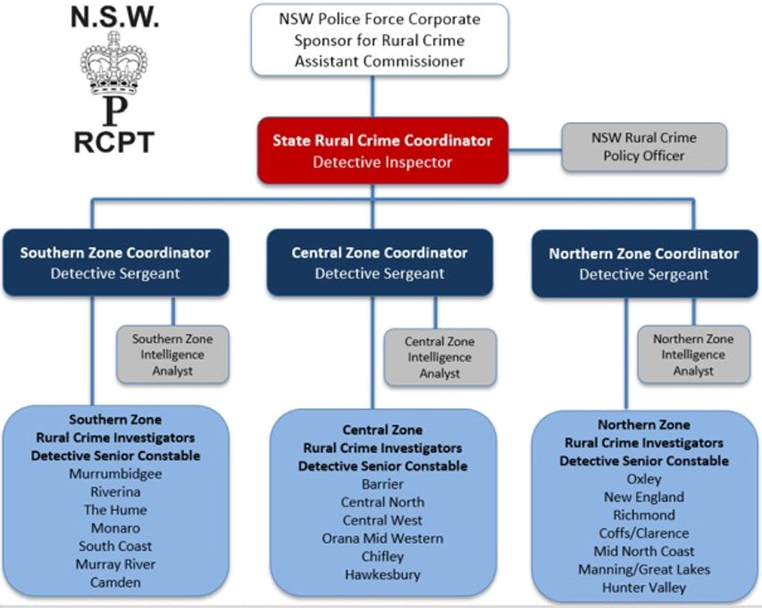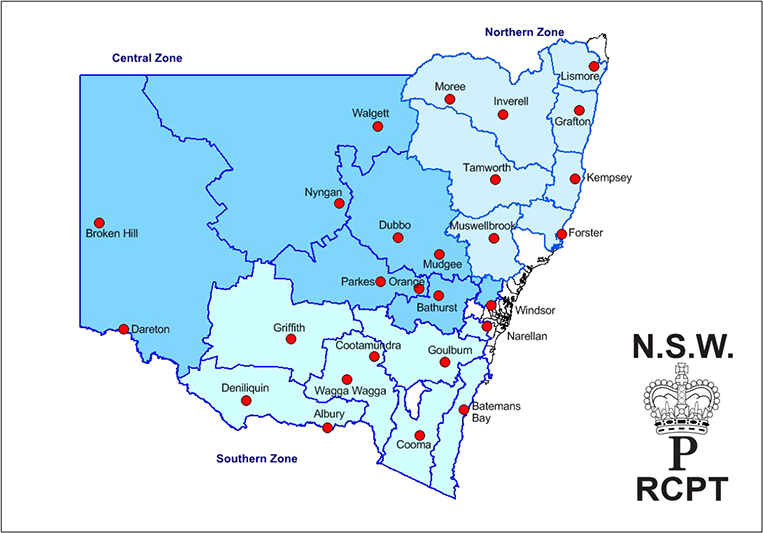

International Journal of Rural Law and Policy, No. 2, 2019
ISSN 1839-745X | Published by UTS ePRESS | https://ijrlp.epress.lib.uts.edu.au
ARTICLE (NON-REFEREED)

Geoff McKechnie, APM
Assistant Commissioner, Commander, Western Region, NSW Police Force.bren1ann@police.nsw.gov
DOI: https://doi.org/10.5130/ijrlp.2.2019.6553
Article History: Received 30/01/2019; Revised 28/06.2019; Accepted 29/06/2019;Published 06/08/2019
Citation: Geoff McKechnie, ‘NSW Police Force and Rural Crime’ (2019) 2 (special issues on Rural Crime) International Journal of Rural Law and Policy. Article ID 6553, https://doi.org/10.5130/ijrlp.2.2019.6553
© 2019 The Author(s). This is an Open Access article distributed under the terms of the Creative Commons Attribution 4.0 International (CC BY 4.0) License (https://creativecommons.org/licenses/by/4.0/), allowing third parties to copy and redistribute the material in any medium or format and to remix, transform, and build upon the material for any purpose, even commercially, provided the original work is properly cited and states its license.
Rural crime has a financial, emotional and physical impact on its victims, their family and the community. Often the victims are isolated, their livestock and equipment are extremely valuable and their rural properties are a family business handed down from generation to generation, with the families working hard and making large sacrifices to keep their business profitable and able to supply the greater community with quality produce.
The direction of the NSW Police Force towards rural crime has evolved over the past 70 years. The renewed focus and creation of the Rural Crime Prevention Team is a significant enhancement on our ability to target rural crime within NSW.
This article discusses the history of the NSW Police Force involvement in rural crime and, particularly, the approaches taken by the Rural Crime Prevention Team since December 2017
rural crime; NSW Police Force; stock theft; Rural Crime Prevention Team
Rural crime has a financial, emotional and physical impact on the victims (often farmers), their families and the community. Often the victims are isolated, their livestock and equipment are extremely valuable and their farms are a family business handed down from generation to generation. These businesses comprise families who work hard and often make large sacrifices to keep their businesses profitable while supplying the greater community with quality produce.
To have a stranger or, even worse, a person known to the victim enter their property without permission and destroy equipment, steal livestock or remove the tools needed to carry out the business is a crime. The community, including the police force, all need to work together to target these offenders. Members of the community, rural industries, government agencies, Courts and the NSW Police Force needs to become a joint force to instil the message that rural crime will not be tolerated.
This article outlines the history of police action to deal with rural crime and current initiatives being undertaken by the police force.
The first dedicated initiative by the NSW Police Force to target rural crime was through the establishment of the Central Police Stock Squad in 1947. The squad was formed to investigate stock theft in NSW and comprised a small Stock Squad, which was stationed at Flemington Stock Sale Yards headed by a Detective Senior Sergeant. Regional Stock Squad Officers were appointed during the 1970s but, in the early 1980s, this squad was absorbed back into general policing duties.
Market prices for livestock and grain increased throughout the 1990s, as did the incidents of rural crime and a call for better policing action from rural communities and industries. The Minister for Police, Minister for Agriculture and the President of the NSW Farmers Association held a meeting in March 2000 to discuss the concerns of rural communities and industries regarding rural crime. From this meeting the NSW Pastoral and Agricultural Crime Working Party (now known as the Rural Crime Advisory Group) was formed.
This Working Party comprised representatives from the NSW Police Force, Rural Lands Protection Boards, NSW Farmers’ Association, the Ministry for Police and the Office of the Minister for Agriculture. The Working Party’s brief was to consider crimes that are perpetrated against primary producers, such as stock theft, wool theft, chemical theft and trespass for the purpose of hunting and to consider ways that government could help rural industries to adopt viable and cost-effective solutions to rural crime. Under the terms of reference, the Working Party agreed to report to the Ministers by September 2000.
It soon became evident to the Working Party that there was very little reliable information on the extent of pastoral and agricultural crime. Improvements were recommended to increase the level of collection and collation of reliable information on all crime impacting rural industries.
The Working Party proposed that Rural Crime Investigators be located at multiple non-metropolitan Local Area Commands (now known as Police Districts and Police Area Commands). The Working Party believed this would address the need for producers to have a direct point of contact with an officer who understood the industry at a local level. As a consequence of this proposal, a NSW Government Cabinet Minute recommended the creation of 33 specialist Rural Crime Investigator positions located at 27 non-metropolitan Local Area Commands within NSW. This Minute was adopted.
The Rural Crime Investigators are designated Detectives and specialised investigators in their field. The majority of these officers have a rural background, including shearers, horsemen and histories of working on family rural properties. The Rural Crime Investigators are supported by a delegated NSW Police Force Corporate Sponsor for Rural Crime (Assistant Commissioner) as well as Region Sponsors for Rural Crime from each non-metropolitan Region (Superintendent).
In 2006, a Civilian Intelligence Analyst was assigned to provide analytical support to the Corporate Sponsor and Rural Crime Investigators on a part time basis. In 2010 this position was increased to a full time Rural Crime Intelligence Analyst.
In 2014 the New South Police Force redefined the definition of rural crime from ‘all crime pertaining to the pastoral and agricultural industries’, to provide a greater understanding of the meaning of rural crime for both NSW police officers and members of the community. The definition is now: ‘Incidents of crime that impact on the function of the pastoral, agricultural and aquaculture industries’.
The primary component of this definition is ‘impact on the function’. It does not include all crime or incidents committed at a rural location. This definition assists police officers to understand how to record rural crime and what type of incidents Rural Crime Investigators will investigate. It also provides members of the community with a reference guide when reporting crime.
To ensure these specialised investigators maintained their high level of skills and knowledge, the Rural Crime Investigators were provided with annual training, which include sending officers to Queensland to participate in the Stock and Rural Crime Investigators Squad (SARCIS) course. This course not only provided excellent training in rural related issues, it also exposed the officers to legislation from the other state and continually enhanced the working relationship between NSW and QLD police officers to target rural crime.
Since 2002, the Rural Crime Investigators have developed various specialised NSW Police Force training courses. These include:
The Rural Crime Investigator must prove to the Assessor that they are competent in the following:
○ Catch
○ Preparation& Groom
○ Saddle & Bridle
○ Trot Circle
○ Canter Circle / Figure 8
○ Jump Cavaletti
○ Hand Gallop on Pattern
○ Open/Shut a Gate Whilst Mounted
○ Crack Stockwhip Whilst Mounted
○ Trail bikes
○ All-Terrain Vehicle (ATV)
○ Bee keeping
○ Small boats
In 2015 the Rural Crime Investigators, in conjunction with the NSW Department of Primary Industries, created a Nationally Accredited Training Course consisting of:
○ Use handheld e-business tools
○ Handle livestock using basic techniques
○ Muster and move livestock
○ Identify and draft livestock
○ Participate in work health and safety processes
This course is conducted every two years and all Rural Crime Investigators must attend to maintain their title as an expert in this investigative field.
In 2017, Commissioner Michael Fuller, APM, made a commitment to the people of regional NSW to further address incidents of rural crime in the state of NSW. During December 2017, Deputy Commissioner Gary Worboys, Regional NSW Field Operations, announced the creation of the Rural Crime Prevention Team.
The key points of this new team are the:
Figure 1 illustrates the current structure of the NSW Police Force Rural Crime Prevention Team.

Figure 1 Structure of Rural Crime Prevention Team: NSW Police Force
This team comprises:
The establishment of this team has resulted in 46 dedicated and specialised officers being appointed; prior to this, there were only 37 Rural Crime Investigators.
Figure 2 shows the three zones into which the Team has been divided: Northern, Central and Southern Zone. Each Zone has one Detective Sergeant coordinating Rural Crime Investigators and at 27 non-metropolitan locations and one Rural Crime Intelligence Analyst.

Figure 2 Rural Crime Prevention Team three zones of operation
In February 2019 the NSW Government confirmed their commitment to reducing rural crime by allocating an additional 18 positions to the Rural Crime Prevention Team which will allow the NSW Police Force to, among other things, create a Detective Sergeant position to assist with leading the Rural Crime Prevention Team on the North Coast.
This section discusses the key aspects of what the Rural Crime Prevention Team has achieved and the future direction for targeting rural crime.
Two hundred and fifty officers have undertaken an internal Rural Crime Workshop across the Western and Southern Regions during 2017 and 2018. These workshops are designed to provide front-line police with an understanding of what rural crime is, what a Rural Crime Investigator does, the impact of rural crime (directly from a rural crime victim) and how to record rural incidents correctly. Participants at the workshop visit a local rural industry relevant to the area in which the workshop is being held.
Although this workshop was designed for front-line police, it is not limited to only those officers. Police Prosecutors and Intelligence Officers have also enrolled in this workshop. During 2019, officers stationed within the Northern Region will be the focus for this workshop.
The primary social media platform for the Rural Crime Prevention Team is the NSW Police Force Rural Crime ‘Eyewatch’ Facebook page. Since the creation of the Team, there has been a 150 per cent increase in the number of followers on the Rural Crime Facebook page.
The social media presence has increased significantly with over 2.2 million people viewing posts during a one month period in 2018. This platform is used to seek assistance in solving many crimes, such as cattle theft, malicious damage, illegal hunting, firearm offences and break and enters on farms.
During 2018, members of the Rural Crime Prevention Team attended 15 agricultural shows, such as the Gunnedah Ag Quip, Mudgee Field Days and Casino Beef Week. They participated in the first rural ‘Coffee with a Cop’ which was held at the Dubbo Regional Livestock Markets on 17 May 2018. Members have also presented at over 45 NSW Farmers’ Association and Local Land Services meetings and workshops.
During September and October 2018, the NSW Farmers’ Association and members of the Rural Crime Prevention Team held 26 ‘Tacking Rural Crime – Security Assessment Workshops’ for farmers across NSW, including at: Henty, Broken Hill, Cobar, Narrandera, Bourke, Dareton, Deniliquin, Coonabarabran, Hay, Muswellbrook, Hillston, Narrabri, Walcha, Condobolin, Walgett, Wauchope, Cooma, Inverell, Oberon, Braidwood, Mudgee, Tenterfield, Kyogle, Trangie, Young and Mungindi.
Topics discussed at these workshops were: steps farmers can take to detect and prevent rural crime; new crime fighting technologies; how to report rural crime to police; and what to do if you are a victim of rural crime.
The NSW Police Force website1 has a dedicated section that addresses rural crime. This page provides members of rural industries with tools and resources to help prevent and raise awareness of rural crime, including:
Over 40 separate operations have been conducted and/or coordinated by members of the Rural Crime Prevention Team during 2018. Separate to offenders being placed before the Courts, results from these operations include:
The Rural Crime Prevention Team also coordinates joint government agencies operations. This holistic approach allows for multiple issues and jurisdictions to be addressed simultaneously. Examples of these government agencies are: NSW Fisheries, Game Licensing Unit, National Parks and Wildlife, Local Land Services.
Rural crime has a multiple million dollar negative impact on rural industries. It is not just the immediate crime that increases this effect. For example: the theft of cows has a direct financial impact, however, these cows could be stud breeding stock created over many generations; it is not just the fence the trespasser drove over whilst illegally hunting, it’s the field of crops the farmer had been waiting to harvest that the offender has ripped up whilst chasing animals.
There is an acknowledgement that the NSW Police Force and the general community all need to change the way rural crime is considered. How should rural crime be targeted? How should it be prevented? What strategies need to be developed to reduce the risk of being a victim?
The Rural Crime Prevention Team has been created to focus on these questions. These questions and more, need to be approached from not only a law enforcement direction but as a group discussion. Members of the community, rural industries, government agencies, Courts and the NSW Police Force needs to become a joint force to instil the message that rural crime will not be tolerated.
1 <https://www.police.nsw.gov.au/safety_and_prevention/safe_and_secure/rural_crime>.